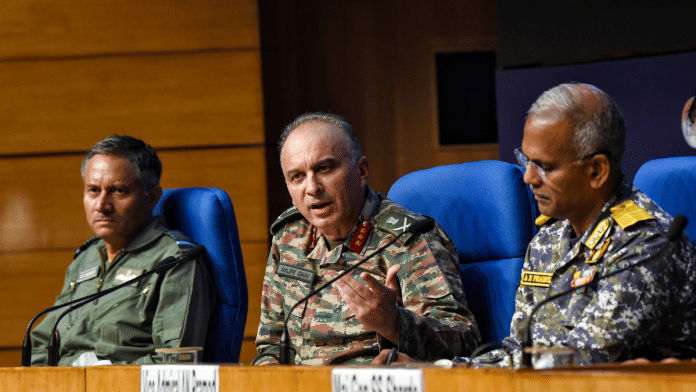Thank you dear subscribers, we are overwhelmed with your response.
Your Turn is a unique section from ThePrint featuring points of view from its subscribers. If you are a subscriber, have a point of view, please send it to us. If not, do subscribe here: https://theprint.in/
Operation Sindoor has been a whirlwind of emotions. From anger to anticipation, from pride to doubt, from hope to confusing despondence. There are a lot of emotions an average concerned Indian citizen is feeling right now. When I try to articulate my thoughts, as a common citizen, on the sequence of events that have transpired in the last month, ever since the dastardly Pahalgam attack, I am largely left with these questions.
Q1- Why were terrorists able to evade security forces so effectively?
It is a cause of alarm if a group of terrorists can cause such carnage and not a single one is caught, one month since. If terrorism is the state policy of a nation, they are quite successful, as this attack with the perpetrators slipping through the security forces seems like a definite cut, one among the thousand that Pakistan means to deliver on us.
Q2- Are we truly a rising global power, considering the type of image our media portrays to the world during testing times?
I was awake, three nights straight, trying to follow and consume as much of the events that were transpiring, as I possibly could – across all media outlets from across the world. The conduct and sensationalism of our media channels paint a rather embarrassing image of the nation in front of the world. Shame.
Q3- Why are we friendless and foe-full on the international stage? Where are some moral or pragmatic allies in this dangerous moment for our country?
Pakistan had overt support from three nations – Turkiye, China, and Azerbaijan. With Western media questioning our choices, Bangladeshis speaking out in favour of Pakistan, and worst of all, the USA taking a public stance that clearly tilts the needle towards Pakistan, I wonder in a true larger conflict scenario will we be left to our own devices? Are we equipped and prepared for that scenario?
Q4- Why is our sanctioning ability towards our adversaries so toothless?
We are finding ourselves wanting in our ability to launch any kind of strategic or diplomatic or economic strike against those who stood behind Pakistan during this conflict. It was alarming to see Turkiye sending in what can only be interpreted as weapons to Pakistan during the tensions. Some media also reported that China was ‘the eyes of Pakistan’ during the military engagements.
Q5- Does HAL and other aviation PSUs now at least feel the sense of urgency to pick up the pace on Tejas, AMCA, and other programs that are quintessential to the Atmanirbhar Bharat in a friendless world?
Q6- Do we need to revisit our international diplomatic doctrine?
We seem to no longer be a party that will be defended on the global stage by any other global player. We are now a global force, a major power. While that is a success that needs to be celebrated, a new reality that seems to be dawning is also the fact a global player is also a global competitor, a peer, and an adversary. This seems to fuel reluctance from other global major powers in supporting us. Do “Strategic Ambiguity”, “Strategic Autonomy”, “Non-Alignment”, “Multi-alignment” and other alphabet soups of Indian diplomatic doctrine still remain relevant in this current landscape? Do we need to harden our doctrine with clear red lines and worldview projection? Is it time to shift our stance diplomatically from silence to speech?
Q7- What does this mean for Kashmiris?
One of the biggest humanitarian consequences of Pahalgam attack and ensuing events is the wrench thrown in the improving situation of Jammu & Kashmir and Kashmiris in general. What impact and policy corrections do these events entail for the Kashmiris?
Q8- Is the “ceasing of firing with mutual understanding” the end of Pakistan’s punishment?
We haven’t taken out the high value targets, Hafiz Saeed and Masood Azhar. We have woefully failed in isolating Pakistan on the international stage. We have not yet been able to hit them diplomatically, no FATF Grey/Black listing, no withholding of IMF loans, no international condemnation of TRF or LeT or JeM. Have we really achieved a blow to terrorists?
Q9- Can we grow despite the dangling Swords of Damocles?
Nuclear threat, Bangladeshi threat, Pakistani threat, Terrorist threat, Chinese threat, and American unpredictability. What can the government tell the nation and nation’s concerned citizens about what we will do about these swords dangling over our heads?
Q10- What will we do about our StratCom capabilities?
How is it that a smaller, almost bankrupt, relatively uneducated nation launches a much more effective and coordinated information war against us on the global stage? We seem to be suffering from a severe lack of initiative on this front. What can be done to improve this in future?
That’s it, just questions this time…
These pieces are being published as they have been received – they have not been edited/fact-checked by ThePrint.


